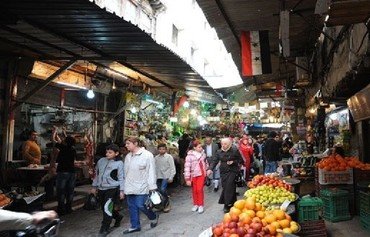Syrian president Bashar al-Assad's rise to power after three decades of his father's iron-fisted rule raised hope of democratic opening. But 20 years later, Syria is isolated and war-ravaged.
Crumbling under a stinging economic downturn, sanctions and nine years of war, Syria is a far cry from the vision al-Assad projected when he was propelled to the presidency a month after his father Hafez died on June 10th, 2000.
"There was a good deal of anxiety in the early stages, as Syria had not experienced a peaceful transition of power in decades and Hafez al-Assad was all many people knew," said Faysal Itani of the Centre for Global Policy.
But "soon this all subsided as Bashar settled in and projected this aura of modernity, youth and openness".
![A crowd lines up outside a pharmacy after the collapse of the Syrian pound caused some medicines to disappear from the market and the prices of available medicines to skyrocket. [Photo courtesy of Syrian Reporter]](/cnmi_di/images/2020/06/09/24434-Syrian-pharmacy-crowd-600_384.jpg)
A crowd lines up outside a pharmacy after the collapse of the Syrian pound caused some medicines to disappear from the market and the prices of available medicines to skyrocket. [Photo courtesy of Syrian Reporter]
![This money transfer and currency exchange centre in Deir Ezzor was closed by the Syrian regime. [Photo courtesy of Sada al-Sharqiya]](/cnmi_di/images/2020/06/09/24433-Syria-money-changer-600_384.jpg)
This money transfer and currency exchange centre in Deir Ezzor was closed by the Syrian regime. [Photo courtesy of Sada al-Sharqiya]
Sworn in at the age of 34, the London-trained ophthalmologist exuded the aura of a reformer who could fundamentally alter Syrian politics through economic liberalisation and a limited opening to the West.
For a brief period after he was voted in via a single-candidate poll, Syria saw a surge in political debate and activism, after almost 40 years of emergency law.
"Bashar was a very different character from the other prominent figures in the regime," said Syria expert Daniel Neep, assistant professor at Georgetown University.
"In a country that had not seen any significant political or economic opening for over a decade, Bashar's ascension to the presidency appeared to signal the promise of long-overdue reform," Neep said.
'Liberaliser idea died quickly'
In September 2000, around 100 intellectuals called for reforms including the lifting of the state of emergency, public freedoms and political pluralism in what became known as the Damascus Spring.
"The idea of Bashar as liberaliser died quite quickly," Itani said.
By the summer of 2001, he was cracking down on dissent. The promise of economic liberalisation also faded as wealth fell exclusively in the hands of regime associates.
"Bashar's 'social market economy' turned out to be a formula for rapacious corruption among Bashar's inner circle," Itani added.
"Economic inequality deepened, and much of the middle class and rural populations fell into dire poverty."
The brutal repression of anti-government protests in 2011, and the war that has since killed more than 380,000 people and displaced millions, have undermined his international legitimacy.
A spate of sanctions imposed by the EU and US, the latest of which are due to go into force this month, have compounded a crippling economic crisis.
Most of the population is living in poverty, and the Syrian pound has hit an all-time low against the dollar, triggering a fresh wave of dissent in regime-held areas while violence continues to stalk regions that evade al-Assad's control.
Syrian economy in tatters
Syrian economist Mahmoud Mustafa told Diyaruna that prices are skyrocketing in all areas controlled by the Syrian regime, shops are shuttered, and many basic goods have disappeared from the markets.
The latest surge in prices can only be described as "insane", he said, noting that the prices of some goods have risen by up to 300%.
Meanwhile, he added, the exchange rate with the dollar has exceeded 3,000 pounds/dollar and has even reached 3,500 pounds/dollar in some areas.
These rates have seen traders stop supplying markets with goods and materials, Mustafa said, pointing out that shops of all kinds, especially those that sell food, have closed their doors, along with many bakeries.
The latest rise in prices has pushed most Syrians below the poverty line by vastly reducing their purchasing power, he said.
Meanwhile, the al-Assad regime "has not made any move to stop the price increases", he said, and instead issued a decision to close exchange and money transfer shops, which has been detrimental to economic activity.
This halted the monthly remittances in hard currency from expatriates that thousands of families depended on and reduced the amount of hard currency available in the markets to almost nothing, he said.
It in turn drove up prices and sunk the value of the pound.
Mustafa said these conditions have started to impact the regime's support base, as objections are beginning to surface even in pro-regime areas, such as Latakia and Damascus, as well as in the southern provinces of Daraa and Sweida.
'Strategic, economic failure'
Syria has lost its status as a regional heavyweight under al-Assad's watch and is now widely seen as heavily dependent on Russia, Iran and an assortment of Tehran-backed militias, including Lebanese Hizbullah.
"Hafez had always kept Syria independent from foreign interference. Bashar has become beholden to external influence to keep his regime intact," Neep said.
"What we are seeing now is a strange, sub-contracted form of political authority that has no precedent in modern Syrian politics."
"Bashar al-Assad's Syria is a strategic and economic failure," Itani said, predicting that in his third decade in power, the country "will be an impoverished rump of its past self".
Fissures also will weaken traditional alliances, he said, as suggested by the recent rift between al-Assad and his tycoon cousin Rami Makhlouf, whose assets were ordered seized by the state last month.
"Bashar resembles Hafez in his tenacity and ability to keep the core of the regime intact," Itani said. "He is just not as competent or as lucky as Hafez was."

![A young Syrian holds a caricature representing Syrian President Bashar al-Assad and Russian President Vladimir Putin as he takes part in a demonstration in the city of Idlib to protest against the Syrian regime and Russian assault on the northern province on February 21st. [Mohammed al-Rifai/AFP]](/cnmi_di/images/2020/06/09/24436-Bashar-Assad-caricture-600_384.jpg)






